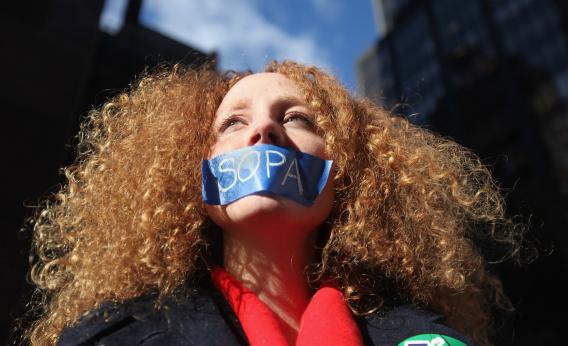Citizens took to the digital streets today to celebrate what has become known as “Internet Freedom Day.” The new holiday celebrates users’ ability to speak, share, create, and innovate. It commemorates the Internet blackout of Jan. 18, 2012, in which tens of thousands of websites participated, to protest the draconian copyright bills SOPA and PIPA.
Yet an incident today reminds all of us that, as my New America Foundation colleague Danielle Kehl has argued on Future Tense, our laws still have a very long way to go before guaranteeing citizens the freedoms they should have in a democracy, especially one that cherishes individual liberty.
As part of today’s festivities, a site called InternetFreedomDay.net was launched. One of the several organizations behind the effort, Fight for the Future, tried to make a point about copyright law by posting a video that included footage of Martin Luther King Jr. delivering his iconic “I Have a Dream” speech. Why? Because, as Fight for the Future’s video explained, King’s speech is still under copyright—and therefore sharing it is an act of civil disobedience that honors both Internet Freedom Day and Martin Luther King Day this Monday. Fight for the Future’s video also explained that SOPA would have made streaming the film a criminal offense—a crime like kidnapping, bank fraud, and downloading too many JSTOR articles in violation of terms of service.
Yet just after 1 p.m. on Friday, the video had been removed from the video sharing site Vimeo, presumably at the request of EMI, which, with the King estate, holds the rights to the speech. You may not realize it, but, as Vice’s Motherboard explained, “You’d be hard pressed to find a good complete video version on the web, and it’s not even to be found in the new digital archive of the King Center’s website. If you want to watch the whole thing, legally, you’ll need to get the $20 DVD.”
Civil disobedience has almost always been about expression. Generally, it’s nonviolent, as defined by Henry David Thoreau, Gandhi, and King. Maybe the disobedience includes marching and gathering on the streets—against anti-loitering laws. It can involve sitting at certain counters in restaurants or refusing to move from a seat on a bus. These peaceful acts of opposition are public expressions in public places. As we have learned from the court decisions in the 1960s, the First Amendment generally protects this sort of protest. Without the ability to criticize unjust laws, in powerful symbolic ways, we can’t change them. And the point of a democracy is that people should be able to convince other people to change a law.
Copyright law should change. It not only fails to serve its primary constitutional goal—promoting the progress of knowledge and useful arts—but it actively hinders that goal and often silences important speech. Last year’s proposed legislation would have punished entire sites for the infringement of some of the sites’ users. But we can’t just hold the line on where the law currently is. We must roll it back. The terms of copyright last far too long: either the life of the author plus 70 years after death for a personal work or 95 years for a corporate work. That length doesn’t encourage more authorship—it merely limits the speakers who could share powerful speeches, books, and films. We should return to a copyright term more in line with the Founders’ choice of 14 years. Furthermore, we need to reduce the egregious penalties for copyright infringement, which make it a criminal offense punishable by thousands of dollars, when the harm of downloading a 99-cent song or watching an iconic speech is often minimal or nonexistent. Indeed, the harm is in the direction—we are locking up speech, including basic political speech in a powerful video about the promise of democracy. If EMI requested the takedown, it has inadvertently called attention to the problems of copyright law.
When many decided to share Dr. King’s famous words, copyright law prevented them from doing so. The act of civil disobedience, itself expressing a critique against copyright law for silencing speech, was silenced. In the hours before the takedown, several people tweeted, encouraging others to watch the speech now, while available, because the speech is so hard to find. Apparently, unless people organize to roll back copyright, it will remain so.
